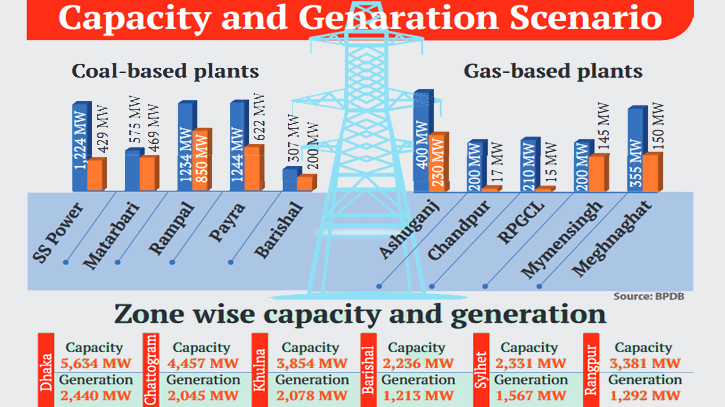
Photo : Messenger
After the industries resumed operations following the Eid holidays, loadshedding increased dramatically across the country, especially in rural areas, due to reduced power generation caused by a shortage of primary fuels.
Power Development Board (PDB) data reveals that gas, LNG, and coal-based power plants, which rely on imported fuels, have cut electricity generation, leading to a decrease in power supply to the grid. Currently, oil-based power plants are meeting demand, but rural consumers and industries are suffering from electricity and gas shortages.
Experts attribute this crisis to excessive dependence on imported fuel. Additionally, the government is struggling to pay outstanding bills due to a shortage of dollars and funds.
According to the data as of Thursday, SS power generation capacity stands at 1,224 MW, but currently, the coal-based plant supplies only 429 MW. The Matarbari coal-fired plant, with a 1,200 MW capacity, supplies 469 MW. The Ashuganj gas-based power plant supplies 230 MW despite having a 400 MW capacity. The Chandpur 200 MW capacity gas-based plant generates 17 MW. The RPGCL gas-based plant with a 210 MW capacity is now generating only 15 MW. The Mymensingh 200 MW plant, run by gas, is now generating 145 MW. The Rampal Power coal-based power plant, with 1,234 MW, is generating 850 MW. The Payra coal-based plant, with a 1,244 MW capacity, is generating 622 MW. The Barishal 307 MW coal-based plant is generating 200 MW. The Barapukuria coal-based plant, with a 250 MW capacity, is generating 120 MW.
Officials claim these plants are under maintenance, but it is surprising that all gas and coal-based plants are simultaneously undergoing maintenance while the government has halted LNG imports and reduced coal imports.
Senior Secretary Md. Habibur Rahman of the Power Division told The Daily Messenger, “The plants Payra, SS Power, Rampal, Adani, and Matarbari are in maintenance.” He said that Payra will resume operations within 2-3 days, while Matarbari and SS Power will remain unavailable until the transmission project is completed.
To support power plants and industries during emergencies, the government established two floating re-gasification Liquefied Natural Gas (LNG) terminals in Moheshkhali. However, these terminals are currently unable to supply gas to the grid when power plants and industries need LNG support.
Summit Group's Floating Storage and Regasification Unit (FSRU) at Maheshkhali in Cox's Bazar, damaged by Cyclone Rimal, has been sent to Singapore for repairs. The 500 million cubic feet per day terminal is expected to take 15 to 17 days to repair at a Singaporean dockyard. Additional time will be required to return the unit to Bangladesh after repairs are completed.
As a result, LNG supply from Summit's floating terminal will not be possible this month.
Petrobangla has already halted spot LNG purchases since one of the country's two FSRUs is out of service. This situation will impact power generation, potentially leading to increased loadshedding during periods of extreme heat and hampering industrial production.
Professor Shamsul Alam told The Daily Messenger, “This situation was predictable. When the government was increasing power generation with random dependence on imported fuels, we advised against it. Now it's time to face the consequences. The government has avoided conventional sustainable procedures, opting instead for risky special laws and paths.”
He added, “I believe private power plant owners are refusing to supply power to the grid due to large outstanding payments owed by the government.”
The state-owned Petrobangla is responsible for importing LNG for Bangladesh, a country of more than 170 million people that relies on this fuel to meet its power demands.
From Sunday, all productive industries will resume full operations, but they will not receive adequate gas for their captive power plants and boilers, which will hamper production.
Business leaders expressed concern that the country's exports have been declining over the past six months due to gas and electricity shortages. Factories are unable to produce according to plan.
Former energy advisor to the caretaker government, Professor M Tamim, said, “Although the present situation has been created due to technical reasons, import dependency has made the sector risky. Summit's LNG unit is shut down. We have a gas demand of 4,000 mmcfd, but we're only getting 2,700. Moreover, currently, 500 mmcfd of LNG is not being supplied to the grid.”
Messenger/Fameema








